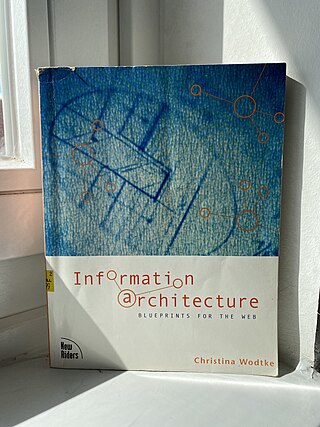Information architecture (IA) is the structural design of shared information environments; the art and science of organizing and labelling websites, intranets, online communities and software to support usability and findability; and an emerging community of practice focused on bringing principles of design, architecture and information science to the digital landscape. Typically, it involves a model or concept of information that is used and applied to activities which require explicit details of complex information systems. These activities include library systems and database development.

The American Institute of Architects (AIA) is a professional organization for architects in the United States. It is headquartered in Washington, D.C. AIA offers education, government advocacy, community redevelopment, and public outreach programs, and collaborates with other stakeholders in the design and construction industries.

The American Institute of Architecture Students (AIAS) is an independent, nonprofit, student-run organization that offers programs, information, and resources critical to architectural education. It primarily serves about 25,000 architecture students enrolled in accredited U.S. collegiate programs each year. Recently, the AIAS has also expanded its reach to international academic programs.

Peter Morville is president of Semantic Studios, an information architecture and findability consulting firm. He may be best known as an influential figure and "founding father" of information architecture, having coauthored the best-selling book in the discipline, Information Architecture for the World Wide Web. For over a decade, he has advised such clients as AT&T, Dow Chemical, Ford, the IMF, the Library of Congress, and Microsoft. Morville was a co-founder and past president of the Information Architecture Institute, and has served on their advisory board. He delivers keynotes and seminars at international events, and his work has been featured in major publications, including Business Week, Fortune, and The Wall Street Journal.

Christina R. Wodtke is an American businessperson and specialist in the area of design thinking, information architecture and Management Science She is currently a lecturer in HCI at Stanford University.
Louis B. Rosenfeld is an American information architect, consultant, author and publisher, known as co-author of Information Architecture for the World Wide Web.

Eric Reiss is an American business and information architecture theorist, consultant and author, known for his work in the field of information architecture, usability, and service design. In 2010, he was named in a blog as "One of the Top 10 European Content Strategists to Watch". In 2019 he sued the Information Architecture Institute following being asked to step down due to multiple accusations of sexual harassment.
The Gelato Federation was a "global technical community dedicated to advancing Linux on the Intel Itanium platform through collaboration, education, and leadership." Formed in 2001, membership included more than seventy academic and research organizations around the world, including several that operated Itanium-based supercomputers on the Top500 list. The organization was active in projects to enhance the Linux kernel for Itanium and GCC for Itanium. The organization took its name from the Italian dessert gelato, paying homage to this by naming sub-projects Gelato Vanilla and Gelato Coconut for varieties of the dessert.
Béla Antal Bánáthy is an American systems scientist, who teaches part-time at the International Systems Institute at the Saybrook Graduate School.
The Institute of Turkish Studies (ITS) is a foundation based in the United States with the avowed objective of advancing Turkish studies at colleges and universities in the United States. Having been founded and provided a grant from the Republic of Turkey in the 1980s, the institute has issued undergraduate scholarships, language study awards, grant money to scholars, and underwritten the holding of workshops. Its work has also attracted controversy by observers who have criticized it as a body held under the sway of the political ideology of the Turkish state, active in the denial of the Armenian genocide and other topics considered taboo, such as the condition of the Kurds in the country.

Maxine Frank Singer was an American molecular biologist and science administrator. She was known for her contributions to solving the genetic code, her role in the ethical and regulatory debates on recombinant DNA techniques, and her leadership of Carnegie Institution of Washington.
The American Society of Human Genetics (ASHG), founded in 1948, is a professional membership organization for specialists in human genetics. As of 2009, the organization had approximately 8,000 members. The society's members include researchers, academicians, clinicians, laboratory practice professionals, genetic counselors, nurses, and others who have a special interest in the field of human genetics.

The Association of Architecture School Librarians (AASL) was founded in 1979. Its membership is open to any person or institution interested in the advancement of academic architectural librarianship and architecture education.

The Washington International Trade Association (WITA) is an organization that hosts forums for discussing issues of international trade in the United States. The meetings hosted by WITA have been used by members of Congress to discuss their goals on trade. Operating as a non-profit, non-partisan organization, WITA itself does not engage in political discussion or debate.
The Asilomar International Conference on Climate Intervention Technologies was a conference developed by Margaret Leinen of the Climate Response Fund and chaired by Michael MacCracken of the Climate Institute. The conference took place in March 2010 and the recommendations were published in November 2010. The goal was identify and minimize risks involved with climate engineering, and was based on the 1975 Asilomar Conference on Recombinant DNA which discussed the potential biohazards and regulation of biotechnology. A group of over 150 scientist and engineers gathered together with lawyers, environmentalists and disaster relief workers in an open meeting to avoid accusations of conspiracy during this discussion. The Asilomar Conference focused exclusively on the development of risk reduction guidelines for climate intervention experiments.
Jared Spool is an American writer, researcher, speaker, educator, and an expert on the subjects of usability, software, design, and research. He is the founding principal of User Interface Engineering (UIE), a research, training, and consulting firm that specializes in website and product usability. He is also an amateur magician. Spool attended Niskayuna High School in Niskayuna, NY.

The Future of Life Institute (FLI) is a nonprofit organization which aims to steer transformative technology towards benefiting life and away from large-scale risks, with a focus on existential risk from advanced artificial intelligence (AI). FLI's work includes grantmaking, educational outreach, and advocacy within the United Nations, United States government, and European Union institutions.

The International LGBTQ+ Travel Association is an association of tourism businesses that welcome the LGBTQ+ community. As of 2016, the association had member businesses in about 80 countries.
Woden–Crystal Lake Community School District (W-CL) was a school district headquartered in Crystal Lake, Iowa. It served Crystal Lake and Woden.
Prescott Community School District was a school district headquartered in Prescott, Iowa, United States. It had a single school, Prescott Community School.









